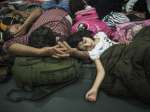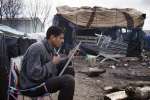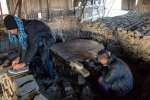- Text size
 |
|  |
|  |
| 
- Français
UNHCR, local officials, religious leaders in northern Somalia debate asylum and Islam
News Stories, 5 October 2009
NAIROBI, Kenya, October 5 (UNHCR) – More than 40 religious leaders from around northern Somalia's Puntland region have taken part in a UNHCR-funded discussion on refugee and asylum law that will help spread awareness about the rights and needs of refugees and displaced Somalis.
The workshop was held last Saturday at Puntland State University in the town of Garowe. Government officials and UNHCR staff also attended the seminar, which looked specifically at how the concepts of asylum and protection are deeply imbedded in Islamic Shari'ah law. UNHCR plans to hold similar workshops involving religious leaders and the local authorities in other areas of Somalia.
"At the end of the workshop we developed a joint communiqué that was disseminated to local media," said Mohamed Salah, a UNHCR protection assistant working in Garowe. "This should further sensitize the [local host] population to continue helping their brothers and sisters who are in need of assistance after fleeing their homes because of the war," he added.
Before Saturday's meeting, UNHCR gave each participant a copy of a comparative study written by Cairo University law professor and dean of the law faculty, Ahmed Abu Al-Wafa. "The Right to Asylum between Islamic Shari'ah and International Refugee Law," was used as a start point for the discussions.
The book, commissioned by UNHCR, says Islam's 1,400-year-old tradition of generosity toward people fleeing persecution has had more influence on modern-day international refugee law than any other historical source.
High Commissioner for Refugees António Guterres, who wrote a foreword to the book, said earlier this year that "all the principles embodied in modern international refugee law are to be found in the Shari'ah. Protection of refugees, their property and families, non-refoulement [forced return], the civilian character of asylum, voluntary repatriation – all are referred to in the Holy Koran."
UNHCR believes that religious leaders in Somalia should be involved in efforts to sensitize host communities to the needs and rights of the internally displaced and refugees. The refugee agency also created a leaflet with key asylum messages translated into Somali and supporting quotes from the Koran. Thousands of leaflets have been distributed since the start of September to the forcibly displaced, host communities, businessmen and the local authorities.
"Somalis are true believers; they strongly trust their local religious leaders when it comes to the interpretation of the Islamic texts. Any initiative engaging religious leaders in Somalia has an impressive impact on the population" UNHCR's Salah noted.
The workshop was held at a time when increasing numbers of people, especially Somalis and Ethiopians, are seeking shelter in northern Somalia to escape from poverty, conflict or persecution. Many seek to cross the Gulf of Aden to Yemen. Sometimes, their presence leads to tension with local communities.
By Roberta Russo and Esther Mwangi in Nairobi, Kenya









































